Mohd Muazzam Mohamed
CHIEF EXECUTIVE OFFICER- BIMB HOLDINGS BHD &- BANK ISLAM MALAYSIA BHD
The COVID-19 pandemic has affected economic and global businesses while highlighting the role of the corporate sector in ensuring the livelihood of the affected society. ISFIRE interviews Mohd Muazzam Mohamed, Chief Executive Officer of BIMB Holdings Berhad and Bank Islam Malaysia Berhad, to get his views on the Islamic finance and banking industry. He also shares his experience leading Malaysia’s premier Islamic financial institution in navigating the current challenging landscape.
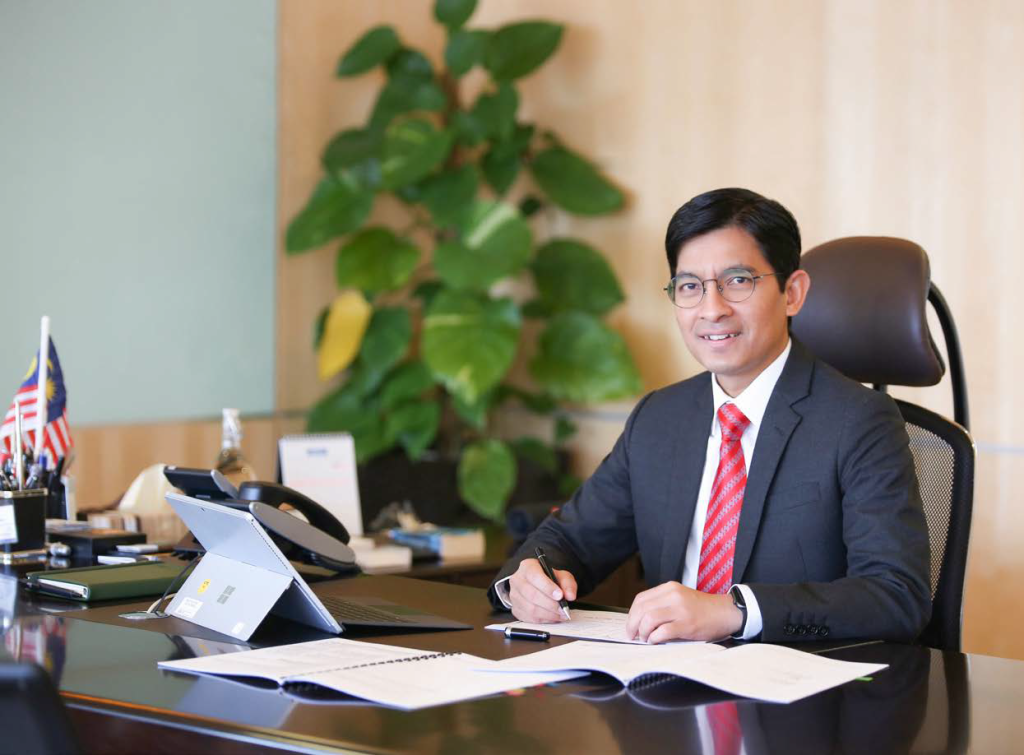
Mohd Muazzam Mohamed joined Bank Islam Malaysia Berhad in May 2015 as the Chief Financial Officer, where he was responsible for Finance Operations, Financial & Statutory reporting, Business Analytics, Capital & Balance Sheet Management and General Administration.
At present, he chairs the Bank’s Management Committee, Management Risk Control Committee, Asset & Liability Management Committee, Financing Committee, IT Steering Committee and several other management-level committees at the Bank. He also serves as a member of Board of Directors of several companies within the Bank Islam group. Prior to that, he was with KPMG from February 1997 until April 2015, as a Partner and Executive Director of KPMG’s Management Consulting practice. In the earlier part of his KPMG career, he spent almost nine years in Financial Audit (including a two-year secondment to KPMG London). In the second part of KPMG career, he spent almost nine years in Management Consulting, leading numerous advisory projects in the public and private sector.

BEFORE WE DISCUSS THIS EDITION’S FEATURE STORY, MR. MUAZZAM MOHAMED, CAN YOU SHARE WITH OUR READERS SOME BACKGROUND AND THE IMPORTANT EVENTS DRIVING THE BANKING INDUSTRY AND ISLAMIC FINANCE IN MALAYSIA?
The beginning and growth of Islamic finance in Malaysia are driven by the commitment to fulfil the market’s actual needs. It includes solutions or Shari’a-compliant financial products that provide continuous real economic benefits.
Many events seeded the growth and expansion of the Islamic banking and finance industry in Malaysia. Among the prominent example is the establishment of Lembaga Tabung Haji, initiated by the renowned scholar, the late Royal Professor Ungku Abdul Aziz Ungku Abdul Hamid, through his white paper entitled “A Plan to Improve the Economic Position of Future Pilgrims” in 1959. Back then, he realised most Malaysian Muslims had refused to place their savings for Hajj in existing conventional banks to ensure the savings are free from any elements of riba. Hence, they would end up putting aside their savings for Hajj at home and risking theft. For some individuals, land or poultry was purchased and later sold to cover the cost of performing their Hajj. These savings affected not only the rural economy but also the nation’s development. Therefore, following the tabling of the white paper, Lembaga Urusan dan Tabung Haji, now known as Lembaga Tabung Haji (TH), was created in 1969.
To date, the accumulated savings of TH depositors have grown to RM80 billion. Besides Halal saving management and efficient pilgrim management services, TH also runs investment activities to provide added value to its depositors. Symbolising the economic triumph and the benefits it brings to the Ummah, TH became an example to other Muslim countries.
On July 1, 1983, Bank Islam was established. The establishment of Malaysia’s first Shari’a-compliant bank was initiated by the Bumiputera Economic Congress held in 1980 and the seminar entitled “Development Concept in Islam” in 1981. This effort was then followed by TH, PERKIM (a non-governmental organisation focusing on preserving Muslim’s welfare in Malaysia) and Bank Islam National Steering Committee. This establishment was a significant leap forward in the development of Islamic banking in Malaysia.
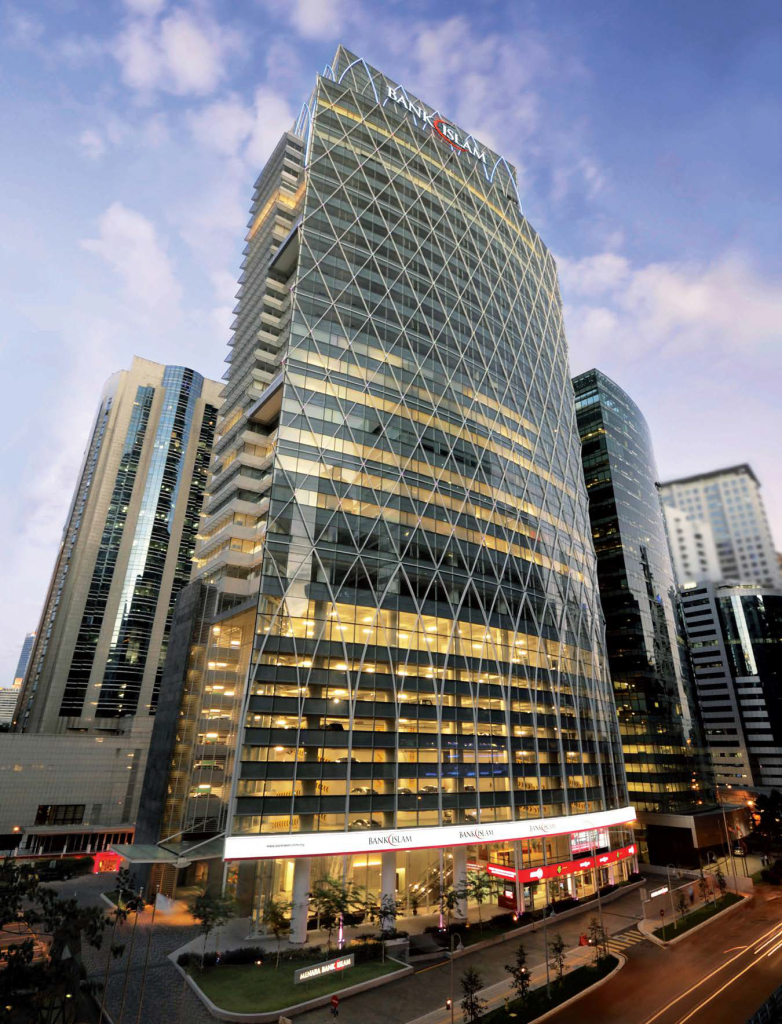
Entrusted with the responsibility of advancing Islamic Banking, Bank Islam was set to capitalise on the Malaysian Government’s incentives to strengthen the country’s position as an international Islamic financial centre. The impetus for the establishment of bank Islam was also driven by the strong desire of Muslims in Malaysia for an alternative form of banking and finance based on the principles of Shari’a law.
Another inspiring event leading to the creation and growth of the Islamic banking industry in Malaysia is when the late Tan Sri Jaafar Hussein, the 4th Governor of Bank Negara Malaysia (BNM), famously declared in the late 1980s his dream of seeing an Islamic banking system operating alongside a conventional one. In his Martin Luther King’s “I Have A Dream” inspired speech, Tan Sri Jaafar expressed his intention and aspiration to see Malaysia has a dual financial system and it will become popular among all Malaysians – Bumiputeras, non-Bumiputeras, Muslims and non-Muslims. He believed that Islamic banking is suitable to all, at all times and in whatever situation. It is not only for Muslim customers. It subsequently set the motion for introducing Islamic windows through Interest-free Banking Scheme in 1993 and later Islamic Banking Scheme in 1998 that propelled the Islamic banking industry into the mainstream in Malaysia.
Under the leadership of Tan Sri Dr Zeti Akhtar Aziz, the former Governor of BNM, a unique long-term plan on Islamic finance was formulated and laid out under Financial Sector Master Plan (FSMP) 2001-2010 and the Financial Sector Blueprint (FSBP) 2011-2020. Both plans had charted Islamic finances’ growth in tandem with increasing awareness and demand for Shari’a-compliant solutions locally and globally.
With the support of the government, regulators and customers, Malaysia’s Islamic banking and finance sector continues to grow and remains resilient despite facing various challenges affecting its business. This sector consistently innovates and offers solutions to meet the demand, need, and market trend without compromising the Shari’a principles while staying committed to providing financial support to affected customers and communities.
‘’The Islamic financial services providers must constantly innovate and plan for products and services that will fulfil the needs of the underserved or unserved segments, for example, gig workers. The gig economy is becoming the choice for individuals seeking employment or supplementing their income in the current challenging landscape.”
BIMB HOLDINGS BERHAD (BHB) AND BANK ISLAM MALAYSIA BERHAD (BANK ISLAM) ARE MALAYSIA’S ISLAMIC FINANCING AND BANKING INDUSTRY LEADERS. AS THE CHIEF EXECUTIVE OFFICER, WHAT IS THE MISSION OF BOTH ENTITIES?
Before I further discuss BHB’s and its subsidiaries’ mission, I want to share with the readers the background of this Islamic financial holding company. Established in 1997, BHB is the first and only listed Islamic financial holding company on the Main Market of Bursa Malaysia. The roles of BHB are to combine, support and ensure the synergy between its subsidiaries, also to be the forerunner and pioneer in Shari’a-compliant financial services in Malaysia. It includes Bank Islam Malaysia Berhad, a full-fledged Shari’a-compliant banking institution in Malaysia, established in 1983; Syarikat Takaful Malaysia Berhad (1984), Malaysia’s first Islamic insurance operator and BIMB Securities Sdn Bhd (1994), Malaysia’s first Shari’a-compliant stockbroking company.
For almost two decades, BHB and its subsidiaries have promoted and expanded comprehensive Shari’a-compliant solutions in the county and contributed significantly to Malaysia’s Islamic banking and finance growth. The effort is in line with the government’s aim to make Malaysia the global Islamic financial hub. Besides that, BHB, via its subsidiaries, also plays a vital role in developing Islamic banking and finance globally by sharing its expertise and experience. Sri Lanka is benefiting from our technical services to create its Islamic banking institution, Amana Bank.
Nevertheless, our role is not merely providing Shari’a-compliant products and services to the market. BNM introduced the Value-Based Intermediation (VBI) concept to the country’s Islamic banking institutions in our effort to solidify the Islamic banking role and impact on the sustainable financial ecosystem. It explains the appropriate strategies to achieve the intended outcome of Shari’a projected through practice, conduct, and offerings that positively impact the economy, community, and environment. BHB and its subsidiaries have supported the effort and made the VBI principles at the heart of our business model, further reflecting our commitment towards financial inclusivity, which ensures development for all and that no one is left behind as we seek to build towards a peaceful and dignified nation.
Alhamdulillah, BHB and its subsidiaries’ business have grown from strength to strength and achieved impressive performance. However, the spread of COVID-19 has affected the domestic and global economy, bringing significant changes to the conduct the conduct of business and operation. This trying climate brings forth the significant role of the Islamic banking industry in supporting customers’ livelihood and source of income. With Community Empowerment being one of Bank Islam’s strategic pillars, the diversifying Islamic social finance instruments, namely zakat (tithe), waqf (endowment) and sadaqa (donation), play a vital role to help the vulnerable, underserved, or unserved groups obtain much-needed banking services.
The COVID-19 crisis is reshaping the global business environment and workplace, and the pandemic may be a significant tipping point for digital transformation. It has also accelerated our digitalisation effort and solution innovation in the Islamic capital market while enhancing the importance of sustainability and resilience through practice that focuses on the environment, social and governance (ESG) in BHB Group. Therefore, our commitment is reflected through the initiatives that touch on the financial inclusivity aspect, ensuring development in our support towards the nation’s recovery.
The spread of COVID-19 has affected the domestic and global economy, bringing significant changes to the conduct of business and operations. This trying climate brings forth the significant role of the Islamic banking industry in supporting customers’ livelihood and source of income.
The measures include technology deliveries, reassessing our business growth, and practising new working norms in facing upcoming challenges.
WHAT CHALLENGES DO ISLAMIC FINANCE AND BANKING PLAYERS FACE IN PROVIDING SHARI’A-COMPLIANT PRODUCTS AND SERVICES TO THE MARKET?
Generally, the Islamic finance industry in Malaysia deals with various challenges, including a rapidly changing business landscape, i.e., the adoption of financial technology. Establishing a Digital Bank and emerging non-traditional players in the Islamic finance sector are expected to boost competition. Thus, industry players need to craft solid business strategies to stay resilient and relevant in the market.
In addition, this industry is always on the lookout for skilled and knowledgeable talents to meet market demands. In a fast-growing digital economy era, the Islamic finance industry requires skills equipped with Shari’a and technological knowledge that can bring the industry to greater heights.
The Islamic banking institutions can compete with conventional players and offer various products and services relevant to the current trend. Shari’a boundaries are not the barrier in uplifting the industry and its deliverables.
Towards achieving sustainable prosperity, our subsidiary, BIMB Investment Management Berhad (BIMB Investment), has partnered with the global asset manager, Arabesque Asset Management Holding Ltd. (Arabesque), in launching equity, Sukuk, and sustainable and socially responsible investment (SRI) equity funds that are Shari’a and ESG- compliant
IN YOUR OPINION, WHAT ROLE CAN ISLAMIC BANKS PLAY IN CLOSING THE FINANCIAL GAP AND HOW TO ACHIEVE INCLUSIVE FINANCE, ENSURING EQUALITY AND BETTER OPPORTUNITIES TO THE TARGETED SEGMENTS?
We at Bank Islam believe that the industry’s role goes beyond being a financial intermediary to create social and economic benefits. To construct an inclusive financial system, increasing Malaysian’s comprehensive financial awareness and financial prosperity are crucial. Making this a success requires participation from every Islamic finance player to provide targeted and complete Shari’a-compliant solutions for real economic benefit.

Hence, the Islamic financial services providers must constantly innovate and plan for products and services that will fulfil the needs of the underserved or unserved segments, for example, gig workers. The gig economy is becoming the choice for individuals seeking employment or supplementing their income in the current challenging landscape.
Taking this into account, Bank Islam applies the approach to strategically offer products, services and Islamic banking initiatives that are also different from the traditional banking practices in achieving social impact and economic returns. It also involves collaborative partnerships with various strategic partners, including the public and private sectors and non-government or non-profit organisations (NGOs). Sadaqa House is among Bank Islam’s main initiatives. The Islamic crowdfunding social platform plays a significant role in reducing the financial gap, especially among the less fortunate. Through this initiative, the public can donate to Sadaqa House, where the fund collected will then be channelled to realising targeted projects, including in the areas of healthcare, education, and entrepreneurship. This initiative is in line with BNM’s aspiration through VBI to strengthen the role of Islamic financial institutions in helping society by focusing on positive impacts.
Since the launch of this social finance arm in January 2018, Sadaqa House has a fund worth more than RM6 million, raised successfully and managed professionally. Proceeds were directed towards assisting thousands of underprivileged individuals, including heart disease patients, microentrepreneurs, university students and indigenous communities.

With the launch of iTEKAD on March 27, 2020, Sadaqa House supported this programme for sustainable income generation and financial resilience of the micro-enterprises in facing the effects of the COVID-19 pandemic. The Bank has allocated RM5.3 million in micro-financing facility and zakat contribution.
Another core initiative under Sadaqa House was the launch of BangKIT Microfinance (BangKIT). BangKIT is the first microfinance initiative using the Qard concept that utilises donation or contribution from the public or organisations to support the unserved and underserved microentrepreneurs in Malaysia.
BangKIT offers a working capital facility for eligible entrepreneurs to start or expand their businesses. Indirectly, it helps build their credit records to qualify them for commercial financings in the future. Holistic in nature, the recipients of the financing facility will also undergo practical training and business coaching run by our strategic partners to ensure their business growth and resilience. To supplement the endless benefits of the facility, recipients who have successfully graduated are encouraged to donate to Sadaqa House so the fund can benefit new recipients.
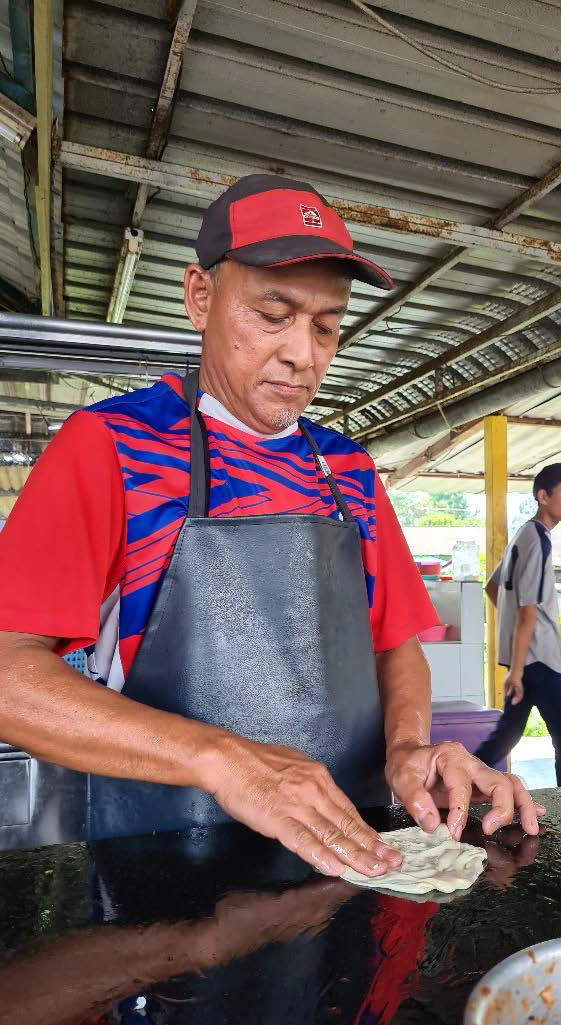
Through Sadaqa House, Bank Islam provides the necessary support to microentrepreneurs affected by the COVID-19 pandemic. The two facilities offered support for sustainable income generation and solid financials for businesses owned by asnaf. Both microfinancing facilities involve providing financing facilities and training, business coaching, and structured financial management. With the support of our strategic partners and appointed changemakers, we enable participants’ growth and ensure their business sustainability. Such effort will fulfil the definition of financial inclusivity: providing convenient, affordable, and quality financial services to all walks of society, contributing to sustainable and balanced economic growth.
IN THE COVID-19 ERA, RESILIENCE AND SUSTAINABILITY ARE CRUCIAL ELEMENTS TO ENSURE BUSINESS CONTINUITY. HOW HAS BANK ISLAM PRODUCED A POSITIVE IMPACT ON RELEVANT PARTIES AND SECURES SUSTAINABLE ISLAMIC FINANCE?
With VBI as our core business model, fundamental value, moral compass, and priorities are to achieve Maqasid Shari’a’ by emphasising on improving well-being and preserving the economy and natural resources. Towards achieving sustainable prosperity, our subsidiary, BIMB Investment Management Berhad (BIMB Investment), has partnered with the global asset manager, Arabesque Asset Management Holding Ltd. (Arabesque), in launching equity, Sukuk, and sustainable and socially responsible investment (SRI) equity funds that are Shari’a and ESG-compliant. The result of this collaboration enables BIMB Investment to lead Shari’a-ESG integration of artificial intelligence technology and big data in its investment processes, thus offering innovative investment solutions.
The current pandemic highlights the importance of ensuring business resilience and enhancing our responsibility to offer proper facilities for the community’s well-being, especially for the vulnerable, underbanked, or unbanked segment.
As mentioned earlier, in empowering the community, our focus is on social finance initiatives that consist of the social crowdfunding platform and microfinancing facilities. Here, technology plays a pivotal role where online facilities widen access to financial services and product delivery to targeted segments.
Sadaqa House is the best example of this effort, where a digital platform is utilised to enable public donations for noble causes.
Bank Islam also partners with microfinancing agencies such as Amanah Ikhtiar Malaysia (AIM), Social Welfare Department (JKM) and zakat authorities in selected states to channel required support for microentrepreneurs hailing from the asnaf categories. The partnership is among our initiatives to empower entrepreneurs by offering microfinancing facilities to help elevate their business capacity. This effort aligns with the United Nation’s Sustainable Development Goals (SDG), focusing on No Poverty.
We must make changes in product structuring, especially in convincing the regulators that products offered to this segment were prepared carefully and responsibly, aimed at elevating the economic benefits to the recipients.
Besides iTEKAD and BangKIT, another product developed in realising this social finance agenda is the Asnaf Financing-i, launched in partnership with Kedah State Zakat Board (LZNK) in February 2021. The main intention of this offering is to enable salaried asnaf to own affordable homes.
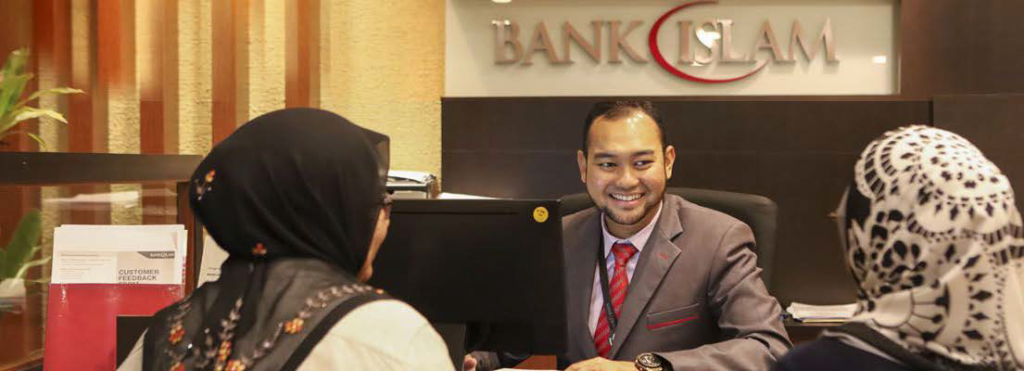
We have also improved credit access to underprivileged communities by collaborating with Yayasan Pembangunan Ekonomi Islam Malaysia (YaPEIM) by providing the Agent Banking facility in locations with limited access to financial services. In addition, we also cooperate with Syarikat Jaminan Kredit Perumahan Berhad (SJKP) to provide home financing for the bottom 40% of the Malaysian household income category (B40) in the country. As a responsible financial intermediary based on the Shared Prosperity Vision, Bank Islam continues to broaden banking services and contributions towards the real economy by supporting economic growth. It aligns with our Real Economy strategic pillar, focusing on enabling and developing the small and medium enterprises (SME) portfolio.
Bank Islam has intensified its support to the SMEs by increasing collaborations with Government-Linked Companies (GLCs) and other important corporations through the Vendor Development and Financing Programme. The Bank also leverages joint government-guaranteed programmes or through Syarikat Jaminan Pembiayaan Perniagaan (SJPP).
Meanwhile, on environmental sustainability, Bank Islam actively supports companies involved in the renewable energy sector and implements green technology solutions, such as solar and hydropower farms and waste management projects. The Bank plans to increase its share of green financing from 4% to 10% in 2022 to reach 12% in 2023.
Despite COVID-19 impacts on business and economy, it does not stop us from innovating and offering various Shari’a-compliant products and services to fulfil our customer’s demands from all segments, thus making Bank Islam a role model for other Islamic banks.
‘’DO YOU THINK THAT ISLAMIC BANKING AND FINANCE CAN OFFER SOLUTIONS THAT ARE RELEVANT TO THE POST-COVID-19 WORLD?
We anticipate the post-pandemic world will see an increase of new players in the gig economy and micro-entrepreneurs. Most individuals in these sectors are employees in the SME segment that is adversely impacted or closed due to the pandemic.
Islamic finance can connect social finance instruments with Islamic banking instruments to offer impactful financing facilities to these vulnerable target segments. We believe that the synergy of various parties can contribute to providing better and more effective financial solutions. The Shari’a-compliant financial solution is always the better option to fulfil customers’ needs not only after the pandemic. During the pandemic, Bank Islam supported the underserved and unbanked customers, notably those adversely impacted. The iTEKAD and BangKIT programmes are examples of Bank Islam’s commitment to this cause. In this time of need, Bank Islam is cognisant of the multi-faceted challenges to our valued customers.
‘’At the same time, I am also aware that the goals set are not achievable without the commitment and dedication of my Bank Islam colleagues and its past leadership, and the trust and continuous support given by our Board of Directors and the stakeholders, especially our customers.”
With Customer-Centricity in mind, Repayment Assistance programme is one of the bank’s initiatives to provide financial assistance to our customers, encompassing all individuals and businesses. The programme is targeted to assist our unfortunate customers who need financial relief. Under this initiative, customers can pay lower monthly repayment or defer their financing repayment for six months, allowing them to manage their cash flow better.
The Bank is also implementing Small and Medium Enterprise (SME) Special Relief Facility (“SSRF”) to help alleviate the short-term cash flow predicament faced by SMEs. This initiative is to help bridge the sustenance of the Real Economy by preserving jobs and ensuring continued economic activity during this period of volatility. With all these measures in place, Bank Islam hopes to cushion the impact of the current adversity for all communities across society. These efforts place Bank Islam as a banking institution that promotes Sustainable Development Goals (SDGs), thus promoting prosperity to the society, economy, and environment.
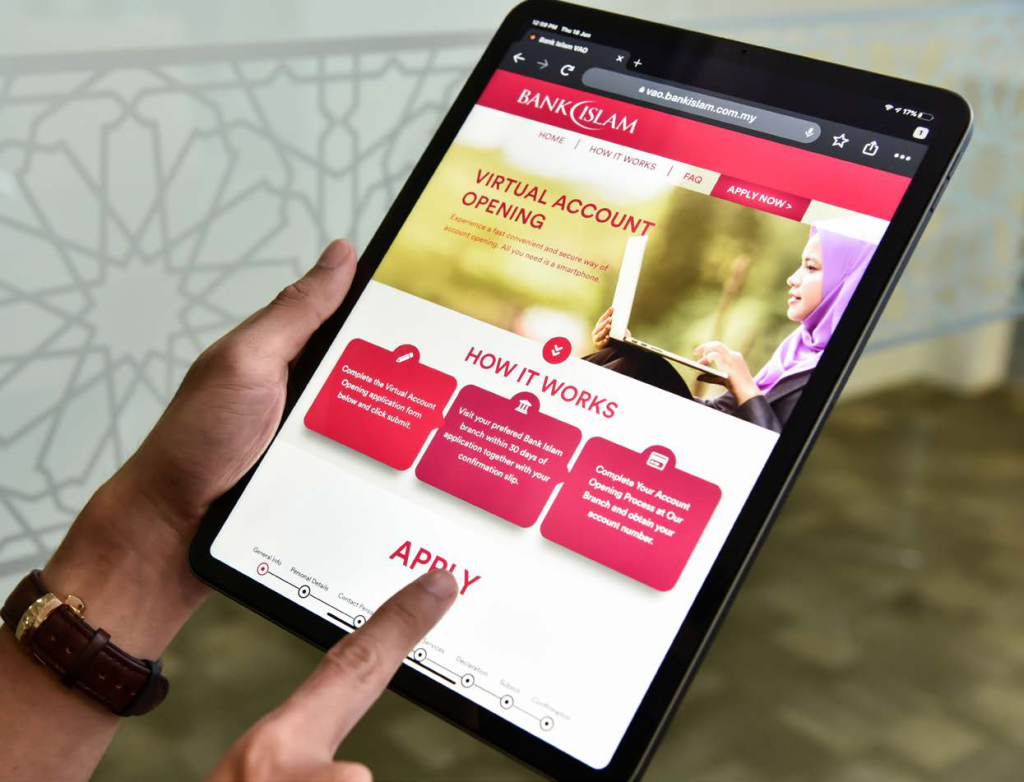
THERE IS NO DOUBT ON THE ROLE OF TECHNOLOGY, PARTICULARLY DURING THE PANDEMIC. HOW CAN ISLAMIC FINANCE PLAY A MORE SIGNIFICANT ROLE IN THE GLOBAL DIGITAL ECONOMY?
COVID-19 has propelled new technology across all aspects of life – from the way we shop to work and attend meetings. The disruption caused by the pandemic outbreak has significantly changed the way we traditionally operate and create a more vibrant Islamic finance industry. The current crisis highlights the importance of digital and social distance in service delivery, and this has created an imperative for businesses to hasten the adoption of technology. Similarly, for banking transactions, we have seen many adapting to the changing circumstances by utilising digital means without the need to visit branches.
Adoption and acceleration of technology is no longer a choice but a necessity in the new “norm” moving forward. FinTech’s can revolutionise the Islamic finance and investment industry in stages. The sector continues to innovate in its effort to keep Islamic finance relevant and competitive in the market. The Fourth Industrial Revolution (IR4.0) became a driving factor for the Islamic finance industry to adapt to current technologies such as artificial intelligence, big data and blockchain. As a country with a comprehensive and dynamic Islamic financial ecosystem, Malaysia has the potential to become a world leader in the field of Islamic FinTech as it shows steady growth in investment and related activities. There are now nearly 200 local and foreign FinTech companies operating in the country, with most of their activities related to mobile payments and electronic commerce. Of these, about 26 are Islamic FinTech players.
Factors including robust regulation, a vast FinTech landscape, market support, and the government’s commitment to strengthening the Islamic economy is paving the way for Malaysia to become a Global Islamic Fintech Hub. The outbreak has also influenced related trends such as socially responsible investment and a more pronounced focus on sustainability. Among the main effects of this development is enabling Islamic financial services and products to be accessed by wider groups of customers, including minorities, especially rural communities that do not have access to banking services.
Current technology has assisted Islamic finance and banking institutions such as Bank Islam in expanding coverage and distribution, managing charitable funds, and developing suitable solutions.
WHAT IS BANK ISLAM’S STRATEGY IN LEVERAGING TECHNOLOGICAL ADVANCEMENT TO FULFIL THE COMMUNITY’S NEEDS AND CUSTOMERS FROM ALL SEGMENTS?
I am confident the combination of higher digitalisation adoption and the emergence of FinTechs will help strengthen the resilience of the Islamic finance industry and open new growth channels.
Bank Islam has set up the Centre of Digital Experience (CDX) as we prepare to establish our own Digital Bank. We are now working to lay the groundwork to materialise our digital banking window, taking advantage of the growing digital economy. The Digital Bank will be developed on a flexible platform that allows FinTech players, the digital market, and other strategic partners to participate directly.
Bank Islam is partnering with several FinTech players to address customer needs and preferences better, enhancing availability, accessibility, usage, convenience, and the quality of specific products. The strategic partnerships involve several areas, including payment, e-wallet, risk, investment, and information technology (IT). Bank Islam will continue to explore the untapped potentials in the technological space so the benefits of Islamic banking can be extended to the market while placing us at par with other financial players. Equally important is to ensure that our cybersecurity measures are in place to manage potential threats. It is essential for consumers to familiarise themselves with the latest technology solutions and learn how the new financial trends work. This is so that they are protected from financial fraud or unintended consequences. Hence financial literacy and technology awareness on the latest trends should be created among the masses.
HOW HAS COVID-19 CHANGED YOUR LEADERSHIP STYLE?
I joined Bank Islam on 11 May 2015 as the Chief Financial Officer before being appointed as the Chief Executive Officer (CEO) of BHB and Bank Islam on 5 December 2018. My career journey from being a Chartered Accountant to a CEO has been challenging, albeit very interesting. COVID-19 emerged just nearly two years after I took over the leadership position of these two institutions. This pandemic has changed how we operate and made me more sensitive to today’s working landscape, current market scenarios and demands. The pandemic has taught me and Bank Islam’s workforce the importance of being agile and the need to make the necessary adjustments.
I always believe every cloud has a silver lining. For example, the pandemic has accelerated Bank Islam’s digital journey and catalysed innovative new products and services we offer to the market. Not solely focused on generating profit, Bank Islam continues to provide financial assistance and support to the community, notably adversely affected customers.
As mentioned earlier, our offering includes providing microfinance facilities through the iTEKAD and BangKIT programmes; and specialised payment facilities to affected individual customers and SMEs such as payment deferrals, reduction of monthly instalment payments, rescheduling and restructuring of their financing facilities.
‘’Compassion is in Bank Islam’s DNA, and I am very proud to be a part of it.”
We have also increased our corporate responsibility initiatives to provide the necessary support to those in need. This support includes supplying personal protective equipment (PPE) and other equipment to medical front liners, food to the needy, and tablets to disadvantaged students to help with their online learning at home due to the closure of schools in the effort to curb the spread of COVID-19.
The concept of sharing our prosperity has been a part of Bank Islam since its inception. I aim to continue this tradition despite the many challenges faced by the industry. Compassion is in Bank Islam’s DNA, and I am very proud to be a part of it.
COVID-19 does not hinder Bank Islam’s growth; in fact, it propels us to move forward. Alhamdulillah, we are embarking on our 5-year business strategy named LEAP25. By 2025, the Bank aspires to be a champion in offering Shari’a Environmental, Social and Governance (Shari’a-ESG) total financial solution with leadership in digital banking and social finance.
The year 2021 will open a new chapter for Bank Islam. Against the backdrop of solid credit metrics following the reaffirmation of the AA3/ Stable/P1 rating by RAM Ratings, BHB will continue the Group’s proposed restructuring efforts. The restructuring will unlock significant value for shareholders. The restructuring will make way for the transfer of listing status from BHB to Bank Islam.
Ultimately, Bank Islam will be the only full-fledged Islamic Bank listed on the Main Market of Bursa Malaysia. The move will open up access to the capital market for a more exciting future. We hope this listing exercise will complete by the end of September or early October 2021, inshaa-Allah.
As the CEO of this prestigious Islamic institution, I am deeply honoured for the opportunity to raise its status without neglecting the Shari’a principles it holds onto, placing Bank Islam as one of the most respected Islamic banking institutions in the country. At the same time, I am also aware that the goals set are not achievable without the commitment and dedication of my colleagues at Bank Islam and its past leadership, and the trust and continuous support given by our Board of Directors and the stakeholders, especially our customers.
Bank Islam will continue to meet customer expectations and provide comprehensive and innovative Shari’a-compliant financial and banking solutions.
‘’I always believe every cloud has a silver lining. For example, the pandemichas accelerated Bank Islam’s digital journey and catalysed innovative new products and services we offer to the market.”
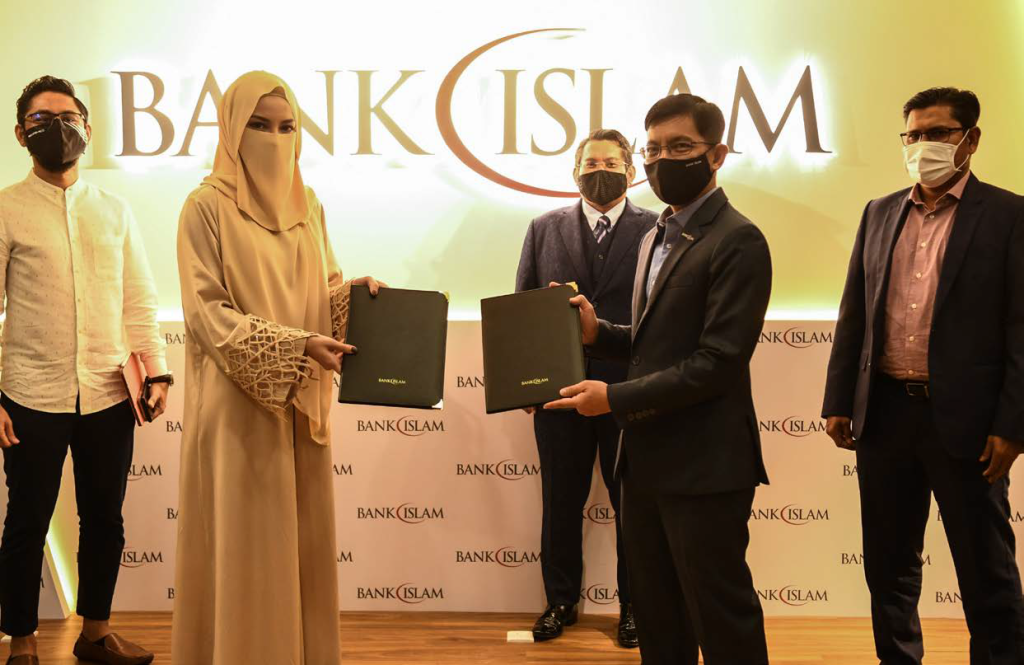
WHAT IS YOUR MESSAGE TO THE GLOBAL ISLAMIC FINANCIAL SERVICES COMMUNITY?
In the Islamic finance system, banking institutions should bring new solutions rather than be an Islamic version of the conventional products. Therefore, innovation in providing such solutions is critical and accordingly, having the capabilities to understand and provide for the ever-changing customer needs is vital. Banks need the agility to adapt and embrace digitalisation in the rapidly digitalised economic environment. Apart from that, we need to embrace and enhance new technologies like robotics process automation and data analytics. As Shari’a-based financial institutions, Islamic banks must maintain a strong position, combining ethics, integrity, and trust in every aspect of their business and operations. The primary focus should be on preserving public confidence and trust in maintaining credibility.



